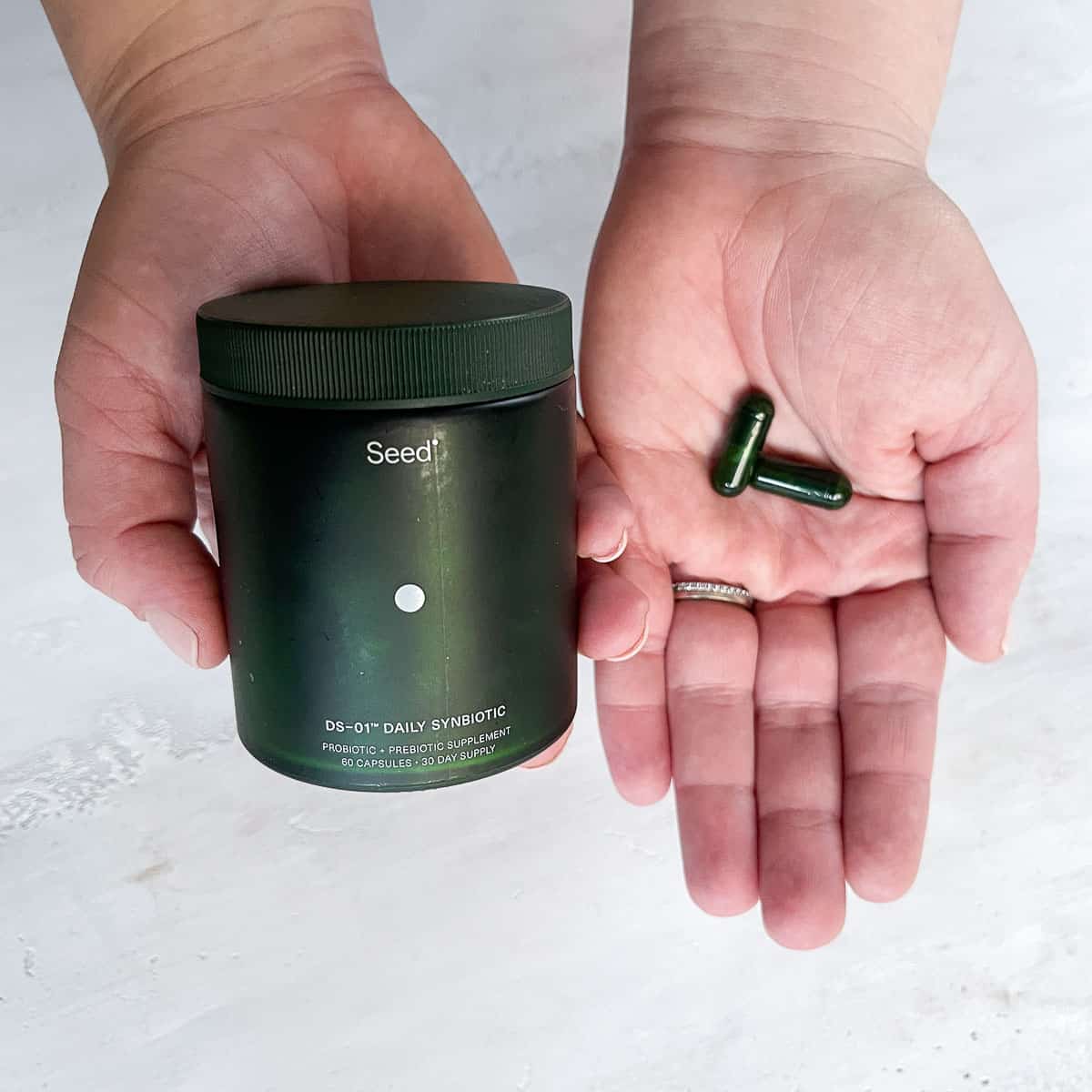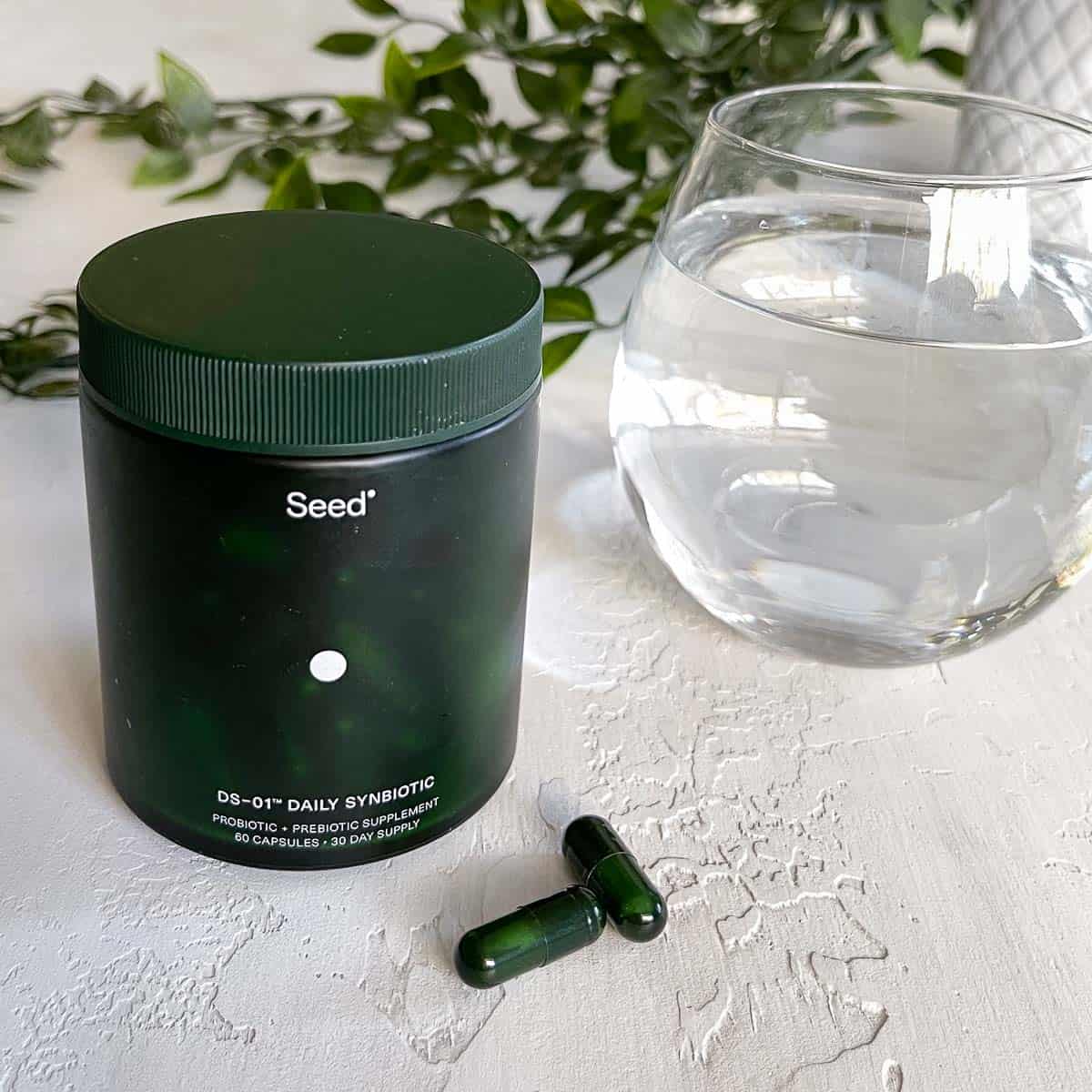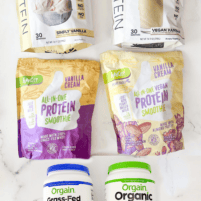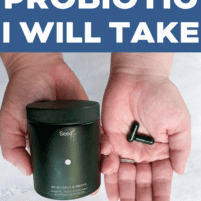Seed Probiotics Review: My 12-Month Journey to Better Gut Health
For over 12 months now, I’ve been taking Seed’s DS-01 Daily Synbiotic (a prebiotic + probiotics), and I’m excited to share my updated Seed review with you. If you’ve been struggling with digestion, bloating, or skin issues like I have, you may be wondering if a high-quality probiotic like Seed could make a difference. Spoiler alert: for me, it absolutely did!
I’ve also started my kids on Seed’s PDS-08 Pediatric Synbiotic, so I’ll share how it’s been helping them too. Whether you’re looking to improve your gut health, or you’re curious if Seed is worth the investment, this post will break down everything you need to know.
Table of Contents
Importance of Gut Health
You may have heard that gut health is important, but did you know that your immune system mostly lives in your gut? About 70% of the immune system is in the gut, where it interacts with good bacteria to maintain a healthy immune response. Our gut microbiome plays a critical role in not only digestion but also supporting heart health, skin health, and even mental clarity (Gut health and mental clarity).
For optimal gut health, a combination of a diverse, plant-rich diet, high-quality meat, and a probiotic supplement is essential. That’s why I turned to Seed, and let me tell you—it has been a game-changer.
Disclaimer: This Seed probiotics review is based on my personal experience and includes citations from research-backed studies on probiotics. It is not intended as medical advice. Please consult your physician to determine if Seed is appropriate for your specific health needs.
What Is Seed’s DS-01 Daily Synbiotic?
Seed’s DS-01 Daily Synbiotic is a blend of probiotics and prebiotics formulated to support gut health, but it offers a lot more than that! The capsules are designed to deliver 24 different strains of good bacteria safely to your colon, where they work to improve digestion, skin health, heart health, and overall wellness.
Unlike many probiotics, which can get destroyed by stomach acid before they even reach your gut, Seed uses ViaCap technology to protect the bacteria as it passes through your digestive system. This ensures that the probiotics make it to where they need to be, so you can experience real benefits.
What Makes Seed Probiotics Different?
After doing a lot of research, I realized that Seed wasn’t your average probiotic. Here’s what makes it stand out:
1. 24 Strains for Comprehensive Health
Seed includes strains specifically targeted for digestive health, skin support, cardiovascular health, and micronutrient synthesis. For example:
- Bifidobacterium longum for gut barrier function: helps improve gut barrier function and support immune health.
- Lactobacillus rhamnosus for digestive and skin health: has been shown to manage digestive discomfort and even support skin health by affecting the gut-skin axis, a connection between gut and skin health.
2. Non-Fermenting Prebiotics
Seed also includes the benefits of non-fermenting prebiotics, like Indian pomegranate, which are gentle on the digestive system. These prebiotics are designed to feed the good bacteria in your gut without causing discomfort. This is especially important for those of us who deal with bloating or follow a low-FODMAP diet.
3. Vegan and Allergy-Free
Seed is free from common allergens like gluten, dairy, soy, and nuts, making it accessible for a variety of dietary needs. As someone who is mostly gluten-free and dairy-free, this was a big bonus for me.
4. No Refrigeration Needed
One of the best parts? No refrigeration is required! Seed is a shelf-stable probiotic for up to 18 months, making it perfect for travel or simply keeping on your kitchen counter. I used to think refrigerated probiotics were better, but Seed made me realize that if bacteria can’t even survive at room temperature, they definitely won’t survive the journey through your gut.
5. Science-Backed and Clinically Tested
What really drew me to Seed was their commitment to science. Their products undergo rigorous third-party testing to ensure quality and potency. Seed is even running clinical trials to study how well their synbiotics improve gut health after antibiotic use and help manage IBS symptoms. Click for more Clinical research on probiotics.

My Personal Seed Probiotics Review & Experience
When I first started Seed, I followed their instructions and eased into it with just one capsule a day to help my body adjust. After a few days, I upped it to the full dose of two capsules daily.
Here’s how it went:
1. Reduced Bloating
Bloating has always been a big issue for me, but within just two weeks of taking Seed, I noticed a huge reduction. I started feeling lighter and more comfortable throughout the day, especially after meals.
2. Improved Skin Health
Another surprise was how much it helped with my skin. I wasn’t expecting it, but after about one month, my complexion became clearer and less irritated. This makes sense since Seed includes strains that support the gut-skin axis, which is connected to skin issues like acne.
3. Regular Digestion
For years, I struggled with irregular digestion and that sluggish feeling, but Seed changed that. After about two weeks, I started going to the bathroom more regularly, and everything just felt more balanced.
4. Energy and Mental Clarity
It wasn’t just physical changes—after about a month, I felt a significant boost in my energy and mental clarity. With four boys under eight, I need all the energy I can get!
Pediatric PDS-08 Pediatric Synbiotic Review
Seed’s PDS-08 Pediatric Synbiotic for kids has also been a game-changer for my boys. It’s a 2-in-1 powdered synbiotic designed for kids aged 3–17. I mix it into their tart cherry juice or yogurt, and they drink it without any issues.
Benefits My Kids Have Experienced:
- Better Digestion: One of my kids had irregular bowel movements, and now they’re both going once or twice a day with ease.
- Stronger Immunity: They’ve been sick less often, and when they do get sick, they recover much faster.
- Healthier Skin: Their skin looks brighter and healthier, and their overall digestion is more stable.
Seed Probiotics Review: Pros and Cons
Pros
- Comprehensive Formula: 24 strains, plus prebiotics, designed for whole-body health.
- No Refrigeration Needed: Easy to take with you when traveling.
- Supports Skin Health: My complexion noticeably improved after about a month.
- Scientifically Backed: The clinical studies and ongoing research give me confidence in the product’s effectiveness.
- Vegan and Allergy-Free: Safe for a variety of dietary needs.
Cons
- Pricey: At $49.99 per month, it’s not the cheapest probiotic out there, but the quality makes it worth it.
- Adjustment Period: Some mild bloating during the first few days, but that quickly went away.
- Not for Everyone: If you’re pregnant, breastfeeding, or have a compromised immune system, consult your doctor before starting.
Is Seed Worth It?
Is Seed worth the investment? In my experience, yes, yes, yes! The improvements I’ve seen in my digestion, skin, and overall health make this product worth every penny. If you’ve been dealing with bloating, irregularity, or skin issues, I highly recommend trying Seed.
And if you’re worried about the price, Seed offers subscription flexibility—you can pause, cancel, or modify your subscription easily. Plus, with my code TASTESLOVELY25, you can save 25% off your first order!
How Seed Compares to Other Probiotics
I’ve tried a few other probiotics in the past, but none have come close to Seed. Most cheaper probiotics don’t offer the range of strains that Seed does, and many don’t include prebiotics, which are essential for feeding the good bacteria in your gut. Seed’s ViaCap technology also sets it apart because it ensures the probiotics actually make it to your intestines instead of getting destroyed by stomach acid.
Seed has a helpful FAQs section on their website, but here are some frequently asked questions answered from my experience.
Seed Probiotics Review FAQs
Absolutely! Seed’s ViaCap technology ensures the probiotics survive digestion and reach your colon, where they can actually work. If you’re investing in a probiotic, make sure it’s one that delivers real results.
Seed is a monthly subscription. You’ll receive a 30-day supply delivered straight to your door every month. The first shipment comes with a reusable glass jar, and refills arrive in eco-friendly packaging. You can easily pause, cancel, or modify your subscription anytime.
Yes, but always consult your healthcare provider first. I’ve been breastfeeding while taking Seed and haven’t had any issues.
No! Seed’s DS-01 is shelf-stable for up to 18 months, so no refrigeration is needed.
Yes, you can take Seed with your vitamins or on an empty stomach. Personally, I take it first thing in the morning on an empty stomach, and it works great for me.
More Honest Reviews
If you’re ready to prioritize your gut health, Seed could be just what you need. And if you try it, I’d love to hear how it works for you—share your experience in the comments below.
Be sure to follow me on Instagram, Pinterest, TikTok, and Facebook for more updates and recipes.






70 Comments on “Seed Probiotics Review: My 12-Month Journey to Better Gut Health”
It’s difficult to know whether the health changes experienced with Seed could also be achieved through alternative methods. Clinical trials are still underway to determine Seed’s effectiveness. The placebo effect may be playing a large role in our positive experience with Seed, since our gut health is deeply tied to our mental health. The placebo effect that we experience when taking Seed might be related to its admittedly great branding. Something about the way the design and market it to us makes me feel somehow better about taking it than I do when taking similar products, but the science really isn’t there to back this up. The only “study” published about Seed is about the coating they use to supposedly protect the strains from our stomach acid. They funded this study themselves and it had mixed results. Until more data is published, I have a hard time justifying paying $50 per month for fancy bacteria pills.
Where can I purchase some.
Hi Susan, you can follow this link here.
Not knowing what to buy ( not even the physicians assistant could suggest ) I truly appreciated all your thoughts. Thank you.
So happy to hear this!
See this is my issue with trying it. Someone in the comments below is having an issue in canceling like a lot of us have experienced in the past with other products/companies. I just wrote them wanting to make a one-time purchase without a monthly subscription. If the product works, then I will sign up for a monthly subscription. I think they would sell more if allowing folks to try it first. I have IBS constipation. I have tried every known pro/pre biotic, every youtube remedy, every over the counter products, every bran, every veggie, everything and nothing works in getting back to a natural daily routine. I’m 65. But I would gladly purchase this product if there was available with a onetime purchase.
Amazon also sells it and no monthly subscription, unless you want it
Thanks for the tip!
Seed has really worked for me and I have had nothing but great interactions with their customer service so I hope you are able to try it and I hope it works! Hugs!
Can you take seed if you have celiac disease??
Yes! My friend has celiac disease and she is always raving at how much it is helping to keep her gut in check. It’s certified gluten free!
I’m in my 60’s & have tried COUNTLESS types of these things – ALWAYS very skeptical – the 1st was Primal Defense by Garden of life – that was abt 35 yrs ago – it was more than expensive for me & I stared off taking 6 tablets 2x daily – I was on it for months but completely helped all the issues I was having at the time –
Here I am 35 yrs later trying to find something else that works – w/o waiting months to notice – SO MAYBE I’ll give it a try
Hi Brenda! I hope it works well for you– It has truly changed my life! Let me know how it goes if you try it!
I started taking seed two capsules as directed this morning on an empty stomach and about 45minutes later felt very nauseous and then vomited is this normal?
I’ve never gotten nauseous from it, but if you did you may want to try it closer to eating food. Or even after eating. Better for it to stay in your stomach.
Are you being paid to endorse SEED?
I love them so much I signed up as an affiliate!
Personally I would not recommend Seed. I took one 1 tablet a day for 30 days and was emptiening my bowels at least 4-5 times a day.
That was way too much. My rectum was so sore I could barely sit in my softest chair.
I had to stop taking it.
So sorry to hear you didn’t have a good experience!
I don’t like it that you can’t buy it one time only it seems like a bit of a scam that you have to subscribe then cancel it.
It’s not a scam, but I understand the frustration with subscribing. For me, it keeps me accountable to taking it and then never having to worry about re-ordering when I need more. I personally have had such a great experience with seed– and I hope you do too if you decide to try it!
If you do not want a monthly subscription, buy it on Amazon